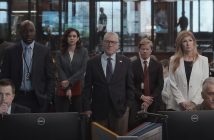2019. It’ll be the fag-end of the next UK parliament; the Marvel cinematic universe will be wrapping up its 21st release (though I’d count on a few more); Macaulay Culkin will turn 40. Los Angeles should also, by then, be a neon, rain-soaked, steampunk megalopolis, if Blade Runner is to believed. The neo-noir that became a true archetype for modern science fiction cinema is set five years from now and it suggests a world where fire will belch into the black sky, lighting up the flying cars that drift by the enormous blimp-mounted adverts, and robotics have become so advanced that we’ll need sophisticated cognitive tests to weed out the skin-jobs (replicants) hiding amongst us.
It feels like there’s a lot of work to be done to get us there. One bittersweet certainty is that five years from now, Harrison Ford will not look as incomparably, inconceivably handsome as he did in 1982. The Final Cut was conceived in 2007 to lay to rest decades of debate over the half-dozen versions of Ridley Scott’s meisterwerk, with the director given complete creative control: no tacked-on voiceovers, no missing scenes, and the full score. The print is immaculate, and the reverie of a score from Vangelis pulsates and shines, an audible dream from the film’s first moments to its enigmatic conclusion. This cinematic rerelease brings to a close the BFI’s season of ‘Sci-Fi: Days of Fear and Wonder’, a celebration tentpoled by the return to the big screen of this, along with 2001: A Space Odyssey.
The unintended context to this rerelease is that Ridley Scott, fresh from the largely ignored biblical whitewash Exodus: Gods and Kings, wants to do as he did with Alien and Prometheus and return to his most critically acclaimed works, bringing a sequel to Blade Runner to audiences in the next few years. Harrison Ford is currently 72 and Scott is 77, and it remains to be seen if a modern update to a much-loved sci-fi franchise is a good idea: opinions vary on Prometheus, but recent reboots of contemporaries like Total Recall, Robocop, Predator and the woeful most recent Terminator update do not bode well. Indeed the Alien franchise, not content with Scott’s Prometheus thread, is spinning off again with District 9’s Neill Blomkamp in the director’s chair. It’s getting farcical.
It makes you long for a simpler time, when Blade Runner first hit the multiplex and made less than $6m profit at the box office – squashed by a goldrush of sci-fi heavyweights that included E.T. the Extra-Terrestrial, The Thing and Star Trek II: The Wrath of Khan. At the time, it was felt to be a little too complex and lacking in action, but Ridley Scott’s adaptation of a Philip K Dick short story is in fact very simple: jaded detective Rick Deckard has to kill (‘retire’) four rogue replicants who skipped out of their off-world slave labour and have come to Earth for a good time. That’s it. The film’s complexity comes from its implied exploration of what it means to be human, married to some stonkingly rich world-building: it takes a big screen to absorb the sheer detail of the extraordinarily congested cityscape on show here. The production designer (Lawrence Paull) and art director (David Snyder) went on to further success (highlights include Back to the Future and Demolition Man respectively) but both undoubtedly peaked with this film, which included visual effects from the great Douglas Trumbull (2001, Silent Running, Close Encounters of the Third Kind).
Murderous replicant Roy Batty probably still represents Rutger Hauer’s most feted role, and I was struck by how little time he actually spends on screen, before gamboling gracefully around the decrepit hotel in pursuit of Deckard at the film’s climax, preparing to utter his most famous (improvised) line. Daryl Hannah was just 21 when she played Pris and inspired legions of fancy-dress costumes that universally fail to measure up. Harrison Ford is iconic as the stubbly, vulnerable detective, squeezing leads and stumbling into danger. Blade Runner in 1982 came off the back of Raiders of the Lost Ark in 1981 and The Empire Strikes Back in 1980 – quite a run. The superb cast all float on top of Vangelis’ inch-perfect score: many of us were over-exposed to the Greek master due to the London Olympics’ insistence on playing eight bars of his Chariots of Fire theme over and over and over again between events, but Blade Runner is right up there with Wendy Carlos’ work on A Clockwork Orange as one of the best electronic scores of all time.
So worth a trip to the cinema? Unquestionably, yes. If you’ve never seen it, then you have to. If you’ve seen it, then it’s never looked or sounded this good, and it’s the definitive version of the story Ridley Scott wanted to tell. It remains to be seen what Scott will do with the film’s legacy in coming years, but catch this one while you still can.
Blade Runner: The Final Cut at selected cinemas across the UK from April 2015. For more information and a list of participating cinemas, visit the BFI website.




